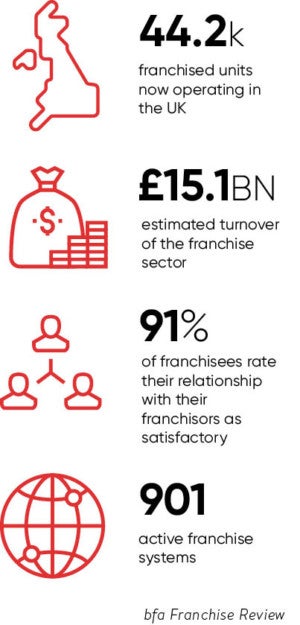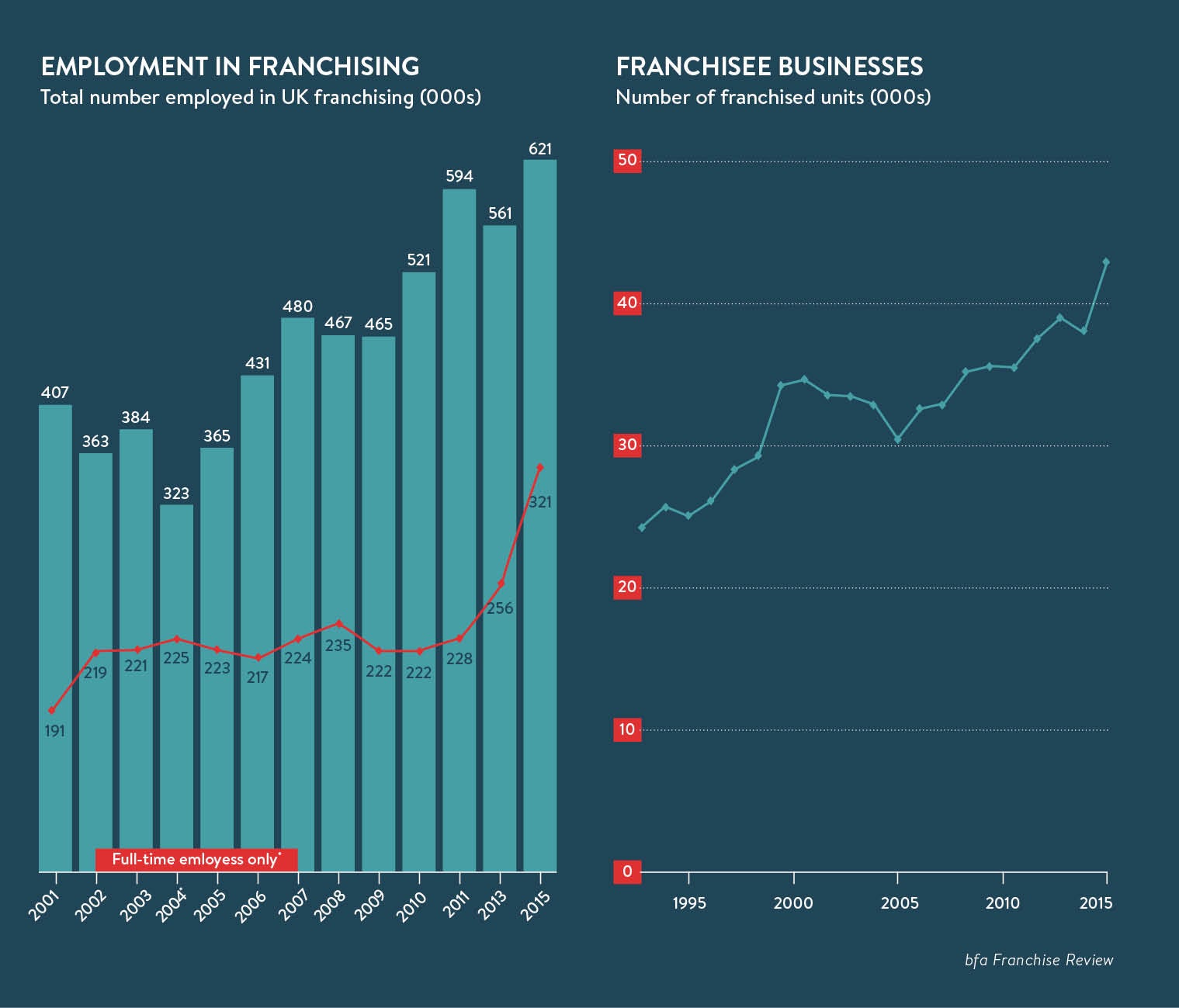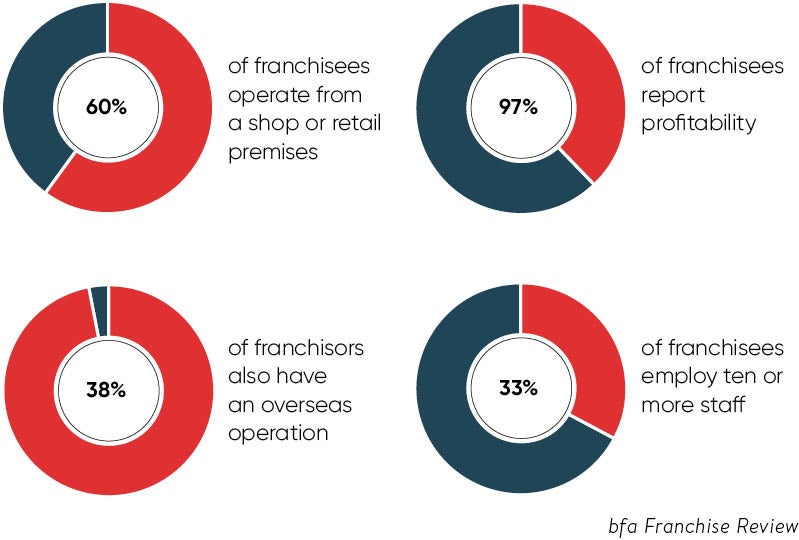 Over the last ten years, franchising’s contribution to the UK economy has risen by 43 per cent, while the number of people it employs has soared by 70 per cent. The proven business model has enabled leading brands, such as Domino’s, Starbucks and KFC, to expand at a phenomenal rate and is the model of choice for growing numbers of overseas brands expanding into the UK market.
Over the last ten years, franchising’s contribution to the UK economy has risen by 43 per cent, while the number of people it employs has soared by 70 per cent. The proven business model has enabled leading brands, such as Domino’s, Starbucks and KFC, to expand at a phenomenal rate and is the model of choice for growing numbers of overseas brands expanding into the UK market.
As it moves into the digital age, franchising faces fresh challenges, but looks set for a prosperous future.
According to HSBC franchise director Martin Francis: “UK franchising is a very active market and franchisors are working hard to maintain their position. New brands are constantly entering the UK market so the competition is that much greater.
“There is still an interest in something different and novel in a crowded marketplace; if it is attractive, people will go for it. Established franchises cannot afford to be complacent and need to focus on developing their unique selling point or USP.”
Some of the biggest players in the fast food franchise sector, such McDonald’s and KFC, have been leading the way, enhancing their offering, not just in terms of the look of their restaurants, but on the customer engagement side. In the age of the consumer, exceptional customer experience holds the key to competitive advantage.
UK franchising is a very active market and franchisors are working hard to maintain their position
“Many of these franchisors are adopting digital technology to improve customer interaction with their brand beyond their restaurants,” says Mr Francis. “They know that their customers can choose to dine out or order food to eat at home. By developing mobile apps and teaming up with delivery service providers, such as Just Eat and Deliveroo, they ensure that customers can still enjoy their products wherever they choose.”
Managing costs is a perennial problem for all businesses, including franchise owners. Labour costs are rising, and with recruitment of quality staff already challenging, those costs could be set to increase after Brexit when staff may be harder to find.
“Some locations’ rents and rates are being affected by cost increases, and there has been some impact on cost of sales because of the exchange rate,” says Mr Francis. “Part of the role of franchisor is to help franchisees grow their business and manage those costs effectively through their greater buying power. This gives them an advantage over independent business owners.”

One notable trend in franchising that has also helped with cost management is consolidation. “This has been happening in the last few years in the UK, where franchisees, particularly within some of the larger systems, are building a portfolio of franchise brands and making the best possible use of their territory. They can leverage their head-office costs and their knowledge of the local environment, properties and staff, and boost cost management efficiencies,” adds Mr Francis. “At HSBC, we’ve seen demand for events where growing franchisors are able to present to such franchisees.”
All the while they face competition from overseas brands, largely from the food and beverage sectors, that are starting to roll out their own franchise networks in the UK.
Mr Francis says: “These include Amorino, which makes Italian artisanal gelato, Turkish bakery café Simit Sarayi and German Doner Kebab. These brands are bringing new ideas and creating competition, so incumbent brands must think very carefully about their USP.”
Adding to the competitive mix are concepts originating in the UK that have used franchising to grow overseas and are now developing it to add to their UK network of corporate outlets. This is a route taken by Wafflemeister, whose outlets offer Belgian waffles, gelato and shakes, and milkshake and juice bar ShakeTastic, both of which have franchise networks in the Middle East.
There are challenges for existing franchise operators as they see new entrants coming in, adopting digital technology and using it to gain a competitive advantage
Food and beverages is one of the biggest and fastest-growing sectors within franchising, but hot on its heels are domiciliary care, and children’s education and extracurricular activities, such as Tutor Doctor, Stagecoach and Little Cherubs.
“Franchises are recognised as being among the top quality providers in the domiciliary care sector,” says Mr Francis. “Among the top ten care providers identified by the Care Quality Commission you find that six or seven of them are franchises. There is such a huge demand for those services and here the franchise model has worked extremely well.”
The franchising industry continues to offer opportunity, support and choice. Those looking to invest in a franchise can still choose from the low-cost entry level brands in sectors such as pet care and personal services, up to the high-end investment opportunities offered by the major global brands. As an industry, it is moving with the times.
Mr Francis says: “There are challenges for existing franchise operators as they see new entrants coming in, adopting digital technology and using it to gain a competitive advantage. They know they can’t afford to rest on their laurels, and it is encouraging to see how they are evolving and adapting their strategies. They are highly entrepreneurial, very aware of what is happening in the marketplace and driving through the necessary changes that will enable them to continue to grow and meet constantly changing customer demand.
“Importantly they are supporting their franchisees as they embrace change. This includes building strong banking relationships, which for us at HSBC have been a key element in financing the capital spend needed.
“Adapting to change is a challenge that all businesses face right now and the pace of change shows no sign of slowing. Given all the benefits of a proven franchise model that has stood the test of time, the strength of the networks, the wealth of investment opportunities, and the ready access to financial and legal expertise and support, the franchising industry is in excellent shape. There is no reason to think that it won’t continue its remarkable growth trajectory regardless of what the future brings.”

GROWTH IN INTERNATIONAL FRANCHISING
Franchising has long been the method of choice for brands looking to expand globally. The business model has universal appeal providing opportunities for those looking to run their own business.
Global markets find the model appealing because of its contribution to economic output. According to a study by the World Franchise Council, approximately two million franchised businesses sustain more than 19 million jobs around the world. On average, franchising contributes 2.7 per cent to national GDPs. The report also highlights the scale of cross-border expansion, citing that an adjusted average of 28 per cent of franchised concepts in a given country were foreign based.
In the UK, the numbers of overseas brands moving into the market and domestic brands expanding into foreign markets have been steadily growing.
Tony Massey, UK deputy head of franchising at HSBC, says: “The UK has always been an attractive market for overseas brands, even more so as the world becomes smaller. Increasingly people in the UK are quite familiar with many of these brands that weren’t previously in the country because they’ve seen them when they’ve been on their travels.”
A good example of this is Canadian coffee company Tim Hortons, which opened its first UK shop in Glasgow in May. The brand, which is owned by Restaurant Brands International (RBI), dominates its domestic market and has become an integral part of Canadian culture.
Mr Massey says: “When the Glasgow shop opened – we had actually put the present UK master franchisee in touch with RBI – people came from all over the country to the launch. They already knew the brand from when they were on holiday in Canada or from friends and family members they have there, and that is increasingly the case with other foreign brands setting up in the UK.”
Plans for a UK chain of Tim Hortons are in the pipeline, creating competition for the likes of Costa Coffee and Starbucks.
In a sign of heightened franchising activity in overseas markets, HSBC has appointed new heads of franchising in the United States, Canada, Mexico and France.
Mr Massey adds: “We see franchising growing in all these different countries, and HSBC is well placed to work with domestic and international brands, provide support and share experience to help drive cross-border expansion of franchises both inward and outward.”



